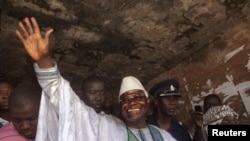Sierra Leone President Ernest Bai Koroma’s government has drawn up a 30-year plan to transform the country from a fragile low income state into a middle income nation.
“As a way of doing that, we have developed what we now call our agenda for prosperity, which is a five-year cascading plan that will lead into an eventual 30-year posterity plan,” said Richard Konteh, the president’s chief of staff. “We are setting up a transformational development plan that will ensure that the returns from our natural resources are not overspent, but to reserve some for posterity, and that we will be able to invest to take care of the people going forward.”
The prosperity plan, Konteh says, consists of eight main programs to stimulate economic growth. The eight include economic diversification, managing the country’s natural resources, accelerating human development, international competitiveness, labor and employment, social protection and women’s empowerment.
Public records show that the youth make up about 60 percent of the country’s population. But a majority of them are unemployed and there are fears this could undermine the administration’s economic transformation efforts.
Konteh says the government is moving to create employment opportunities for the youth.
“We have set up the National Youth Commission and a separate ministry for youth affairs charged with the responsibility of ensuring that jobs are created for the youth and the interests and concerns of the youth are addressed,” said Konteh.
He also said the government has plans to build a youth village to train young people how to develop skills needed in the job market.
“What will happen in the youth village is that we will equip it with all types of possibilities for training so that you can go there get trained so that when you come out you get jobs immediately, either in the mines or on the oil rigs,” said Konteh.
Some critics have said the government has not been effective in maintaining law and order especially, in the capital, Freetown, and that this has harmed the climate for business investment from both local and international investors. But, Konteh said situation is improving.
“We have seen the restructuring of the entire security set up of this country and [are] setting up of the office of national security. We also have the intelligence unit set up to ensure that we are getting intelligence information useful for us to be able to take proactive decisions where actions are necessary and we are building the capacity of the police and building other security apparatuses across the country,” said Konteh.
“As a way of doing that, we have developed what we now call our agenda for prosperity, which is a five-year cascading plan that will lead into an eventual 30-year posterity plan,” said Richard Konteh, the president’s chief of staff. “We are setting up a transformational development plan that will ensure that the returns from our natural resources are not overspent, but to reserve some for posterity, and that we will be able to invest to take care of the people going forward.”
The prosperity plan, Konteh says, consists of eight main programs to stimulate economic growth. The eight include economic diversification, managing the country’s natural resources, accelerating human development, international competitiveness, labor and employment, social protection and women’s empowerment.
Public records show that the youth make up about 60 percent of the country’s population. But a majority of them are unemployed and there are fears this could undermine the administration’s economic transformation efforts.
Konteh says the government is moving to create employment opportunities for the youth.
“We have set up the National Youth Commission and a separate ministry for youth affairs charged with the responsibility of ensuring that jobs are created for the youth and the interests and concerns of the youth are addressed,” said Konteh.
He also said the government has plans to build a youth village to train young people how to develop skills needed in the job market.
“What will happen in the youth village is that we will equip it with all types of possibilities for training so that you can go there get trained so that when you come out you get jobs immediately, either in the mines or on the oil rigs,” said Konteh.
Some critics have said the government has not been effective in maintaining law and order especially, in the capital, Freetown, and that this has harmed the climate for business investment from both local and international investors. But, Konteh said situation is improving.
“We have seen the restructuring of the entire security set up of this country and [are] setting up of the office of national security. We also have the intelligence unit set up to ensure that we are getting intelligence information useful for us to be able to take proactive decisions where actions are necessary and we are building the capacity of the police and building other security apparatuses across the country,” said Konteh.









